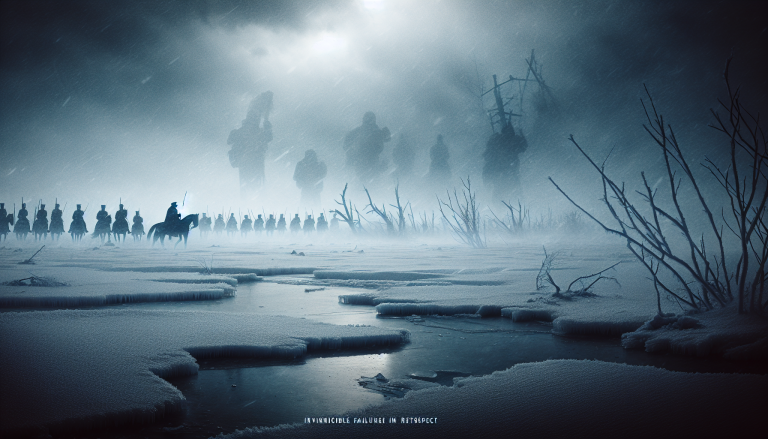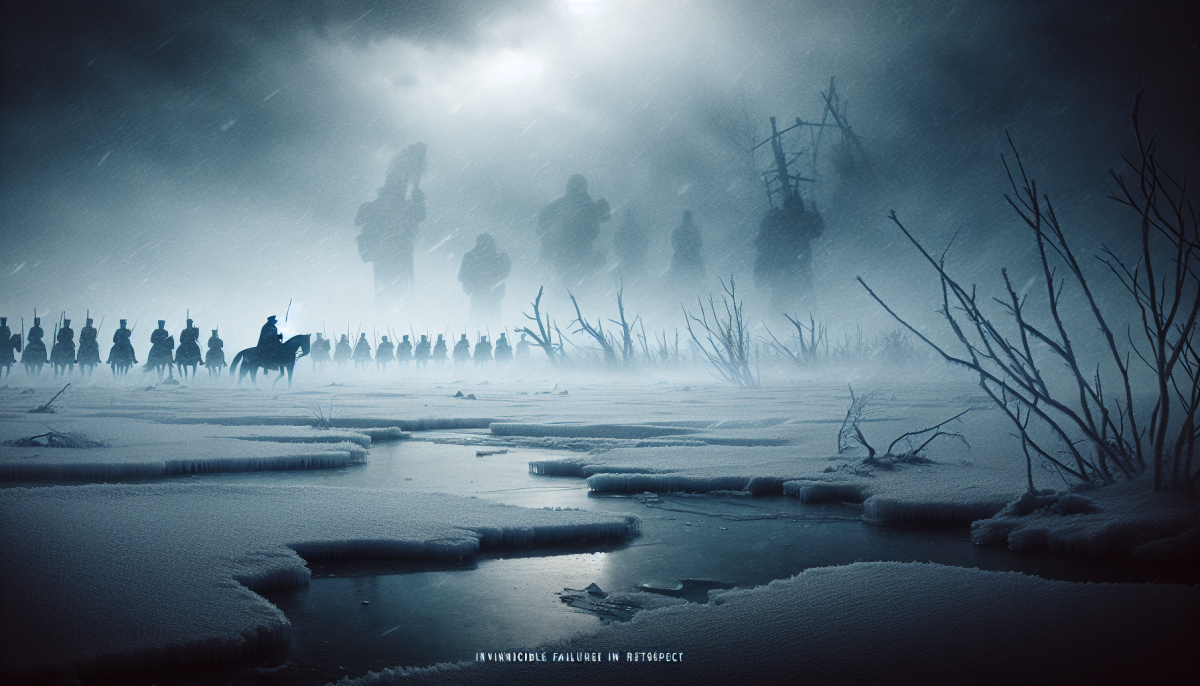Beating a Dead Horse: The Comical Saga of Napoleon’s Ill-Fated Invasion of Russia
In the annals of military history, few events capture the essence of futility quite like Napoleon Bonaparte’s disastrous attempt to conquer Russia in the winter of 1812. This ill-conceived campaign, which saw the once-mighty French Emperor marching his army straight into the jaws of the Siberian frost, has long been the subject of mirth and mockery. And when it comes to “beating a dead horse,” this particular historical blunder stands tall as a shining example of a truly futile endeavor.
It all began with Napoleon’s insatiable thirst for conquest. Having already carved out an impressive empire that stretched from the Pyrenees to the Elbe River, the diminutive Corsican couldn’t resist the lure of adding the vast expanse of Russia to his growing list of conquests. Spurred on by dreams of glory and a belief in his own invincibility, Napoleon set out with an army of over 600,000 men, confident that he would be able to bring the “Bear of the North” to heel.
What followed was a series of comical blunders that would make even the most hapless military commander wince. As the French forces marched deeper into the Russian heartland, they found themselves increasingly at the mercy of the elements. The harsh winter weather, which Napoleon had grossly underestimated, quickly transformed his grand invasion into a nightmarish retreat. Soldiers, ill-equipped for the biting cold, succumbed to frostbite and hypothermia by the thousands, their frozen bodies littering the icy landscape like so many discarded toys.
But the true comedy of errors didn’t stop there. In a desperate attempt to salvage what was left of his once-mighty army, Napoleon made the fateful decision to retreat along the same route he had taken to reach Moscow. This proved to be a colossal mistake, as the French found themselves harassed by Russian forces at every turn, their already depleted ranks thinned further by the relentless attacks.

As if the physical hardships weren’t enough, the French were also forced to contend with the psychological torment of their situation. Trapped in a frozen hell of their own making, they were subjected to the taunting jeers of the Russian peasantry, who would gleefully shout “Bonjour, Monsieur!” as the beleaguered troops stumbled past.
One can almost imagine the scene, with Napoleon, his once-immaculate uniform now tattered and soiled, trudging through the snow, his face a mask of barely contained rage as his soldiers, their morale shattered, trudged behind him. It’s a sight that would have been comical, were it not for the sheer scale of the disaster unfolding.
And yet, even in the face of such overwhelming defeat, Napoleon refused to admit defeat. Like a stubborn child clinging to a broken toy, he continued to pour resources into the doomed campaign, determined to salvage some semblance of victory from the jaws of total disaster.
This futile effort to “beat a dead horse,” as it were, only served to compound the comedy of the situation. Napoleon’s repeated attempts to rally his forces and mount a counterattack were met with increasingly farcical results, as the French Army, reduced to a mere shadow of its former self, struggled to even maintain a coherent defensive line.
The crowning moment of this absurd tragedy came when Napoleon, faced with the stark reality of his impending defeat, finally made the decision to abandon his army and make a hasty retreat back to France. In a move that would become the stuff of legend, the once-mighty Emperor slipped away in the dead of night, leaving his beleaguered troops to fend for themselves against the relentless onslaught of the Russian forces.
It was a cowardly act, to be sure, but one that only added to the overall sense of farce that surrounded the entire campaign. As the remnants of the French Army struggled on, their morale and numbers dwindling with every passing day, the world could only shake its head in disbelief at the sheer scale of the disaster that had befallen the once-invincible Napoleon.
In the end, the Invasion of Russia stands as a testament to the folly of hubris and the futility of clinging to a lost cause. Napoleon’s dogged determination to conquer the Russian bear, even in the face of overwhelming odds and mounting disaster, is a cautionary tale of what can happen when a leader becomes too enamored with their own legend.
But for all the tragedy and heartbreak that surrounded this campaign, there is also a certain undeniable humor to be found in the sheer absurdity of it all. The image of Napoleon, his grand ambitions reduced to a frozen, ignominious retreat, is one that has captured the imagination of countless comedians, satirists, and historians over the years.
Indeed, the phrase “beating a dead horse” has become synonymous with this particular historical blunder, a testament to the enduring legacy of Napoleon’s ill-fated invasion. It’s a reminder that even the mightiest of conquerors can be brought low by the combined forces of nature, hubris, and sheer, unadulterated folly.
So the next time you find yourself confronted with a truly futile endeavor, a quest that seems destined to end in nothing but failure and embarrassment, take a moment to reflect on the cautionary tale of Napoleon and his disastrous Invasion of Russia. For in the end, the only thing more tragic than a grand defeat is the desperate, pathetic attempt to cling to the illusion of victory, long after the battle has been lost.
